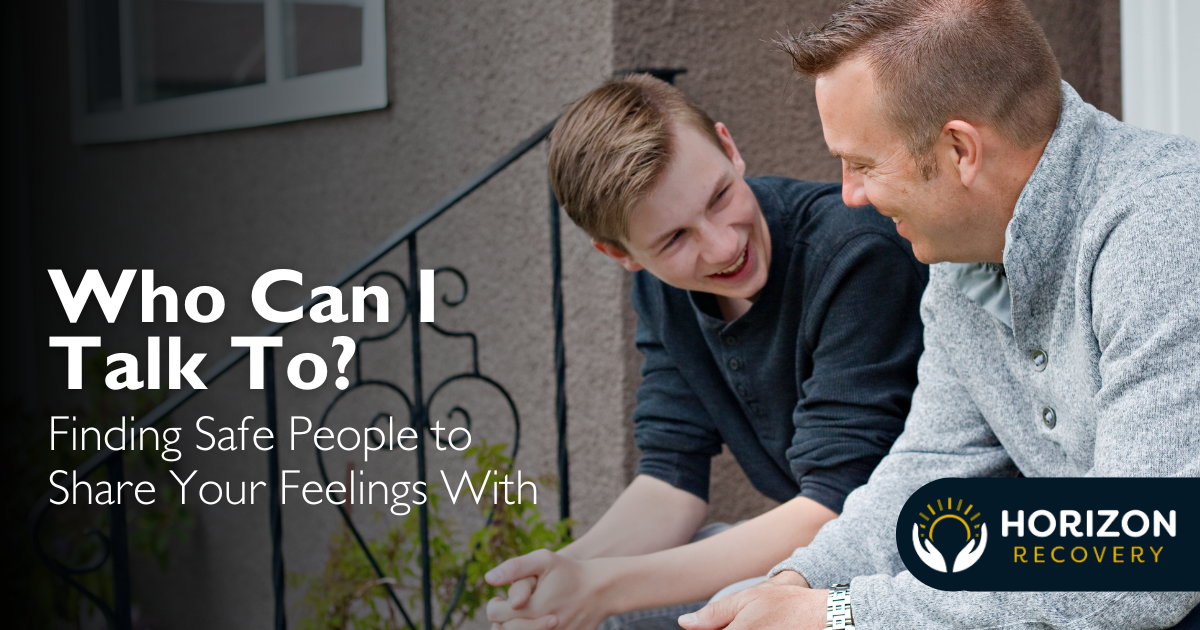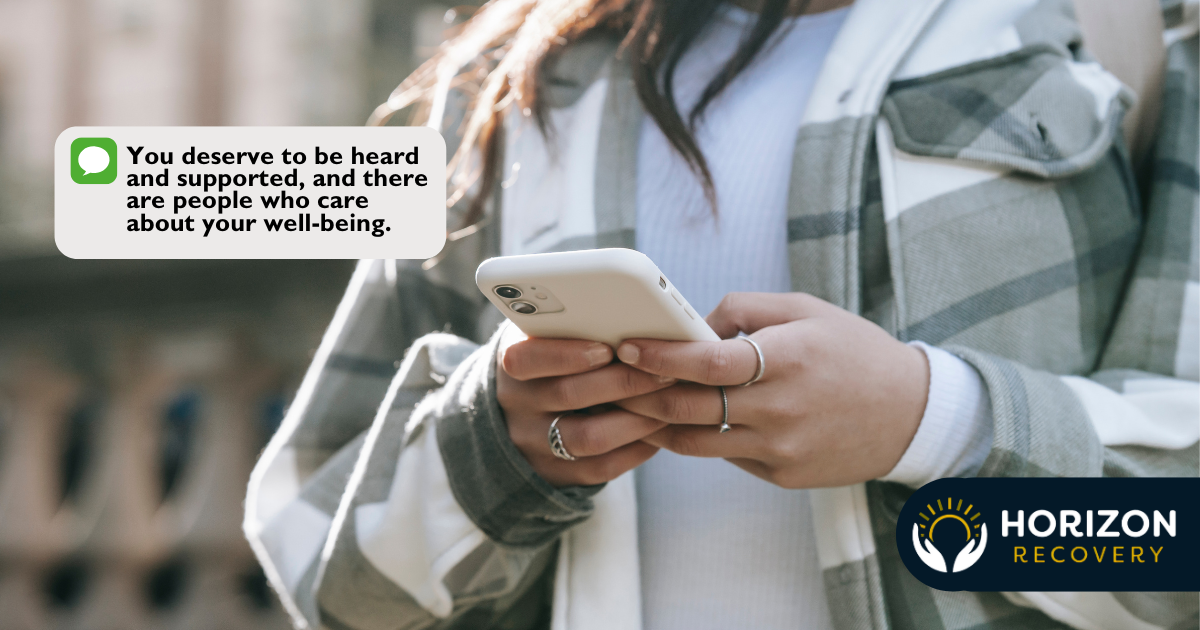
Who Can I Talk To? Finding Safe People to Share Your Feelings With

Talking about your emotions can feel overwhelming, especially if you’re struggling with stress, anxiety, or depression.
You might wonder:
- Who can I trust?
- Will they understand?
- What if they don’t take me seriously?
These concerns are completely normal, but you don’t have to go through this alone.
Whether you’re feeling sad, anxious, or just need someone to listen, there are safe people in your life who want to help.
This guide will walk you through how to start a conversation with a teacher about mental health, tips for talking to parents about your feelings as a teen, and how to tell if a counselor or therapist is a good fit for you.
Executive Perspectives:
Brian Carlisle, RN, FNP-C, MSLE Administrator | Horizon Recovery “In my years as a first responder to emergency situations, I’ve witnessed how the simple act of opening up to one trusted person can interrupt a dangerous spiral of isolation before emotions become overwhelming, creating that crucial bridge to professional support when it’s needed most.”
Patrick Buehl Executive Director | Horizon Recovery “Finding that first safe person to talk to isn’t just about relief in the moment—it’s about learning to trust your own emotions as valid experiences deserving of attention and care, a foundational skill that transforms how teens navigate their mental health journey far beyond any single conversation.”

Why Talking About Your Feelings Matters
When you keep difficult emotions bottled up, they can feel heavier over time. Talking to someone you trust can:
- Help you process your emotions
- Give you support and guidance
- Help you feel less alone
- Make it easier to find solutions to your problems
You deserve to be heard and supported, and there are people who care about your well-being.
How to Start a Conversation with a Teacher About Mental Health
Teachers spend a lot of time with students, so they often notice when something is off. If you’re struggling with your mental health, a trusted teacher or school counselor can be a great person to talk to.
Steps to Start the Conversation
- Choose a Time and Place
- Try talking to your teacher before or after class when they’re less busy.
- If you’re nervous, send an email first to ask for a private conversation.
- Be Honest and Direct
- You don’t have to share every detail—just let them know you’re struggling.
- Example:
“I’ve been having a really hard time lately, and I don’t know what to do. Can I talk to you?”
- Ask for Help or Guidance
- Teachers aren’t therapists, but they can connect you with resources like school counselors or mental health programs.
- You can say:
“Do you know who I can talk to about this?”
What If My Teacher Doesn’t Understand?
Not all teachers will respond the way you hope. If one teacher isn’t helpful, try talking to another trusted adult at school, like a counselor, nurse, or coach.
Tips for Talking to Parents About Your Feelings as a Teen
Talking to parents about mental health can be scary, especially if you’re unsure how they’ll react. But opening up to them can help them understand what you’re going through and support you.
How to Start the Conversation
- Pick a Calm Time
- Avoid bringing up serious topics during an argument or when they’re stressed.
- Try talking after dinner, on a walk, or during a quiet moment at home.
- Use “I” Statements
- Instead of saying, “You don’t understand me!”, try:
“I’ve been feeling really overwhelmed lately, and I don’t know how to handle it.”
- Instead of saying, “You don’t understand me!”, try:
- Be Clear About What You Need
- If you just want them to listen, say:
“I don’t need advice right now—I just need to talk to someone.” - If you need help finding a therapist, say:
“I think talking to a counselor might help. Can we look into it together?”
- If you just want them to listen, say:
What to Do If You’re Scared to Talk to Your Parents About Mental Health
If you’re afraid of how they’ll react:
- Write a letter or text if talking in person feels too hard.
- Talk to another trusted adult first (like a school counselor).
- Ask a friend or relative to help you bring it up.
If your parents don’t take your concerns seriously, don’t give up—seek support from another trusted adult, teacher, or school counselor.
Can I Talk to a Coach About My Mental Health?
Yes! Coaches can be great mentors and role models. If you trust your coach, you can open up about what’s going on.
What to Say to a Coach
- “I’ve been struggling with a lot of stress and anxiety lately. Do you have any advice?”
- “I’m not feeling like myself these days, and I don’t know how to deal with it. Have you ever been through something similar?”
- “I need someone to talk to, and I trust you. Can I share something personal with you?”
What If My Coach Can’t Help?
Coaches aren’t therapists, but they might be able to connect you with resources or encourage you to seek professional help.
How to Tell If a Counselor or Therapist Is a Good Fit for a Teenager
Finding the right therapist is like finding the right pair of shoes—it has to fit well for it to work.
Signs of a Good Therapist
- They make you feel comfortable and respected
- They listen without judging
- They give helpful tools and advice
- You feel understood after talking to them
Signs It Might Not Be a Good Fit
- They interrupt or don’t really listen
- They make you feel guilty or judged
- You feel uncomfortable opening up to them
What If I Don’t Like My Therapist?
- It’s okay to switch therapists if you don’t feel comfortable.
- Tell your parents or counselor you want to try someone else.
- Therapy is about YOU, and you deserve to have a therapist who supports you.
What If I Don’t Know Who to Talk To?
If you don’t feel comfortable talking to parents, teachers, or coaches, you still have options.
Other Trusted Adults You Can Talk To
- School counselors – They’re trained to help students with mental health struggles.
- Family members – An aunt, uncle, older sibling, or grandparent can be a safe person to confide in.
- Friends’ parents – Sometimes, talking to another trusted adult can feel easier.
- Online support – Some websites and hotlines let you talk to someone anonymously.
Helplines for Teens
- Crisis Text Line: Text HELLO to 741741 for free 24/7 support
- 988 Suicide & Crisis Lifeline: Call or text 988 for help
- Teen Line: Call (310) 855-4673 or text TEEN to 839863
These resources are completely confidential and can help you figure out your next steps.

Horizon Recovery is a Trusted Resource
If you’re struggling with your emotions, you don’t have to go through it alone.
There are safe people who want to support you, and Horizon Recovery is here to help. Our team specializes in teen mental health and provides a safe, understanding space to talk about what you’re going through. Whether you need guidance, professional support, or just someone to listen, we’re here for you.
Reach out to Horizon Recovery today—because you deserve the help and support to feel better and move forward.
More posts like this
No items found.
.svg)
Guiding your teen’s path to mental clarity, sobriety, and a hopeful future.
For more information or to schedule a visit, please reach out to us today. Our empathetic and caring team is here to support you every step of the way.
.svg)
.avif)
.svg)
.svg)